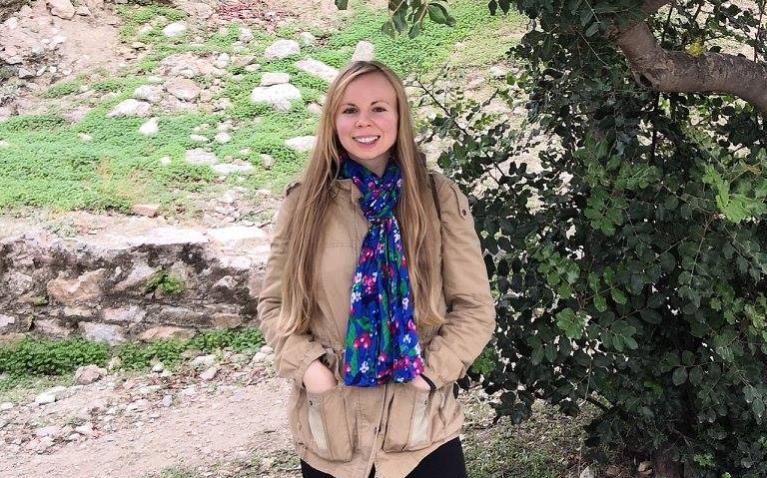
Rachel Vivian Helmer
Master of Arts in Germanic Studies (MA)
Research Topic
Racism and residential school participation in German-language Mennonite literature
Literature and migration; literature and visual arts; critical European Cultural Studies; gender, race, ethnicity; diversity and super-diversity; social studies approaches to literature; postmigration studies; narratives of belonging; avant-garde studies; exile studies; art and bioart performances; biopolitics; images of the body; Indigenous studies; practical approaches to decolonization;
G+PS regularly provides virtual sessions that focus on admission requirements and procedures and tips how to improve your application.
These videos contain some general advice from faculty across UBC on finding and reaching out to a potential thesis supervisor.
Dissertations completed in 2010 or later are listed below. Please note that there is a 6-12 month delay to add the latest dissertations.
This dissertation examines depictions of refugees in twenty-first-century German-language literature by Elfriede Jelinek, Jenny Erpenbeck, Navid Kermani, Maxi Obexer and Firas Alshater. Their selected works challenge stereotypical narratives about refugees as ‘undesirables,’ ‘invasive others,’ and ‘problems’ that threaten liberal nation-states in Europe. This study aims to illustrate how their texts convey that refugees are persons with many complex social identities rather than ‘invaders.’ My interdisciplinary methodology is based on three pillars: a mobility paradigm taken from human geography, a philosophical discussion of personhood, and notions of place derived from human geography and philosophy. I will show how interconnections between mobility, personhood, and place are relevant because refugees are adaptable persons in need of a new place (at least temporarily), but they experience a differential mobility compared to privileged migrants. First, the mobility paradigm enables a reading of literature that shows how current European Union asylum rules attempt to prevent displaced persons from accessing individual member country jurisdictions. As a result, refugees’ ability to physically move towards and within Europe is restricted. Second, literature can evoke philosophical ideas of personhood that illustrate detrimental effects when the label ‘refugee’ is repeatedly affixed to a displaced person’s life story. This label overrides all their past, present, and future experiences, and it unjustly portrays them as ‘problems’ or ‘undesirables’ rather than resourceful and capable individuals. Third, literature can reflect how places are shaped, maintained, and continually changed because social relations, experiences, and understandings intersect in persons’ life narratives. The findings of my interdisciplinary study are relevant for literary discourses on the categorization of migrants and on current European Union politics that support the free flow of goods and money but undermine the arrival of those in need of refuge.
View record
This dissertation is a literary studies analysis of select German-language prose, poetry and essays by the contemporary Japanese author Yoko Tawada. In this study I utilize and expand upon Tawada’s own concept of ‘fictive ethnology’ as a highly critical and self-reflexive literary approach that can be located throughout her texts. I argue that this fictive ethnological or counter-ethnographic literary technique is what directs the political charge behind Tawada’s poetics. My focus then is on how Tawada’s texts as cultural critiques undermine binary distinctions of ‘otherness’, destabilize the position and authority of the author/narrator representing the other, and reveal the ideology and power structures behind representing, constructing and classifying difference. Unlike the descriptive and textual model of ‘writing culture’ that engraves and freezes culture into words, Tawada’s fictive ethnological texts stress the fluid and performative dimension of culture and identity. Therefore, I also demonstrate how these texts are much more about inventing, rather than finding, the self, and about denaturalizing taken-for-granted assumptions about cultural, ethnic and racial differences that are anchored in essentialist, biological and binary logics.The core chapters of this study braid together representations of photography, skin and race and their variegated deployments in Tawada’s texts, and then explicate their ideological underpinnings. Photography, skin and race, as textual and visual representations, metaphors and themes, are fundamental to how Tawada’s protagonists are commodified and racialized as ethnographic objects; how they self-identify and are read by others according to restrictive cultural literacies; and how they are classified and made meaningful according to their bodies, especially when these bodies are seen as racially and ethnically marked. Yet, Tawada’s texts do not simply represent bodies and identities as they already are, but rather the processes, rituals, discourses and social practices that make them intelligible as raced, gendered, or ethnically marked beings. Each chapter therefore highlights, in connection to theories of gender and racial performativity, how Tawada’s texts convey the quotidian, repetitive and ritualistic performance of gendered, racial and ethnic identities, but also how these identities are transgressively (mis)performed against the script.
View record
If this is your researcher profile you can log in to the Faculty & Staff portal to update your details and provide recruitment preferences.
